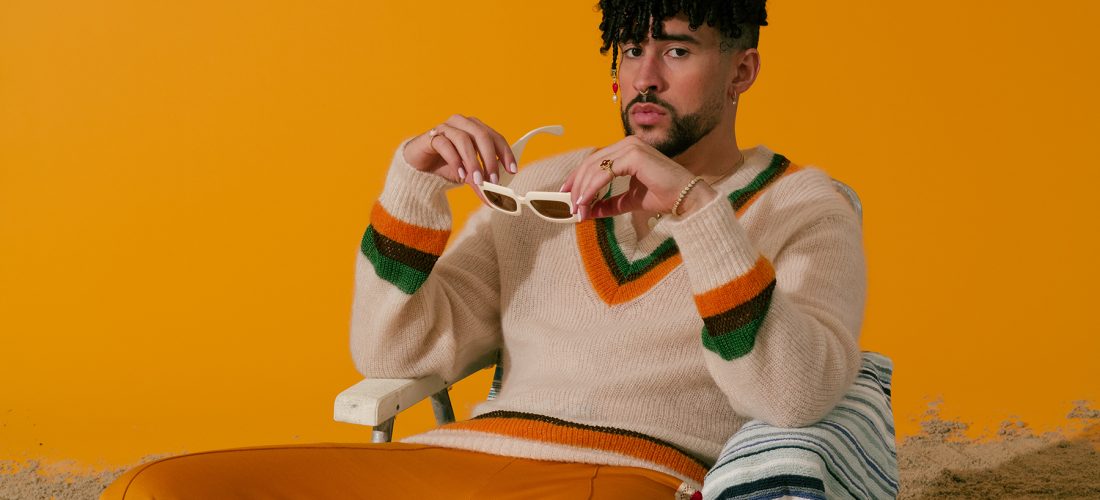Bad Bunny Puts His Vacation Responder up and Creates for a While on ‘Un Verano Sin Ti’
Exactly how much bigger can reggaeton get? This is a perpetually grating question that’s followed the genre around as it’s skyrocketed to the very center of the mainstream over the last few years and become one of the most omnipresent sounds on the planet. To naysayers, the music represents an annoyingly large bubble that’ll pop and fizzle out any day now, while fans and artists are hell-bent on proving that there’s limitless space for it to keep growing. Unfortunately, certain acts—driven by the popularity, profitability, and commercialization of Latin music—haven’t exactly helped the situation by churning out an endless cycle of albums, stuffed with mass-produced, factory-style tracks that have oversaturated the market and left the scene feeling uninspired.
From the second he shot out of Puerto Rico, a former grocery bag boy turned full-fledged superstar, Bad Bunny has been the lovable weirdo who represents an expansive future for reggaeton. He’s been the most-streamed artist on earth for two years in a row, and each of his full-length albums—his 2018 debut X100Pre, 2020’s YHLQMDLG, and last year’s El Último Tour Del Mundo—have broken up boring formulas by mixing up touches of old-school reggaeton, trap, pop-punk, rock, and electro-pop. Yet every Bad Bunny project now comes with increasingly gigantic hopes and expectations, the anticipation often boiling on high, like a pressure cooker. So, on Un Verano Sin Ti, Bad Bunny decides to take the edge off. Rather than feeding into speculation about the ever-expanding scale of the genre and what peak he’s out to conquer next, he chooses to lean back and have fun with a loose, leisurely set of 23 songs, his longest tracklist ever.
In interviews, Bad Bunny said he was thinking about visits he took to the coast of Puerto Rico as a kid, inspiration that informs some of the album’s Caribbean sounds and laidback spirit. His carefree, seafaring approach works at its absolute best when Bad Bunny dives into the glowing waters of the alternative scene and brings the talent of indie luminaries such as Bomba Estereo (“Ojitos Lindos”), Buscabulla (“Andrea”), and The Marias (“Otro Atardecer”) to the masses. More expected, and less compelling, collaborations include Rauw Alejandro on “Party” and Jhay Cortez on “Tarot,” though it’s also nice to see pioneers like Tony Dize get love on “La Corriente.” So much time affords him more genre-hopping than ever, and he livens Un Verano Sin Ti up with mambo on “Despues De La Playa” and throwback trap on “Dos Mil 16.”
Bad Bunny adds a little longing and heartache to the lyrics, striking a balance between summer and sadboy vibes. But there’s also remarkable political and social depth to the content. Fans have speculated Bad Bunny wrote “Andrea” about Andrea Ruiz, a 35-year-old woman who warned a court about her dangerous ex-boyfriend; nothing was done, and the man confessed to killing her after her partially burnt body was found on the side of a road in Puerto Rico. The song’s emotion is heightened with vocals from Buscabulla’s Raquel Berrios, who uses the opportunity to talk about the perspective of women on the island, where domestic violence and femicides have been on the rise. Another charged moment comes on “El Apagón,” which refers to the power outages that have affected Puerto Rico since the island’s power grid was decimated during Hurricane Maria. The song is a raging electro-banger, full of the energy and frustration of a blackout. Bad Bunny enlists his girlfriend Gabriela Berlingeri for an outro that touches on Puerto Rico as a colony and tax haven for uber-wealthy American outsiders: “Lo que me pertenece a mí se lo quedan ellos/Que se vayan ellos/Esta es mi playa, este es mi sol” (“What belongs to me they keep/Let them go away/This is my beach, this is my sun”).
Un Verano Sin Ti does fall into some of the problems of modern reggaeton. Many people pointed out that though Bad Bunny draws inspiration from the Dominican Republic in particular, no Dominicans appear in the actual features. And the length of the album produces some lulls and selections that are pretty mid: Unsurprisingly, the most mainstream reggaeton songs on here land among the least interesting. Still, the album is already an overwhelming success by streaming standards especially. When Un Verano Sin Ti dropped on Friday, Bad Bunny became Spotify’s most streamed artist in a single day as he reached 183 million plays and surpassed a record previously held by Drake. The album also became the most-listened-to album on Spotify so far in 2022, and seven of the songs are currently duking it out on Spotify’s Daily Top Songs Global chart (“Moscow Mule” sits at number two, while the Bomba Estereo -assisted “Ojitos Lindos” is at number three.) Those kinds of stats are a reminder of what Bad Bunny can do if you just let him put his vacation responder up and create a while.
